Analyst market research: where do they study, what tools do they use and how much do they earn
Netology partners - the company “ Normal Research ”, together with the recruiting agency New.HR and the anonymous job search service GeekJob.ru - conducted an in-depth study of the analysts market. Among the topics covered are whether it is possible to be a successful analyst without a specialized education, how much they earn and what tasks analysts solve. We share the most interesting.
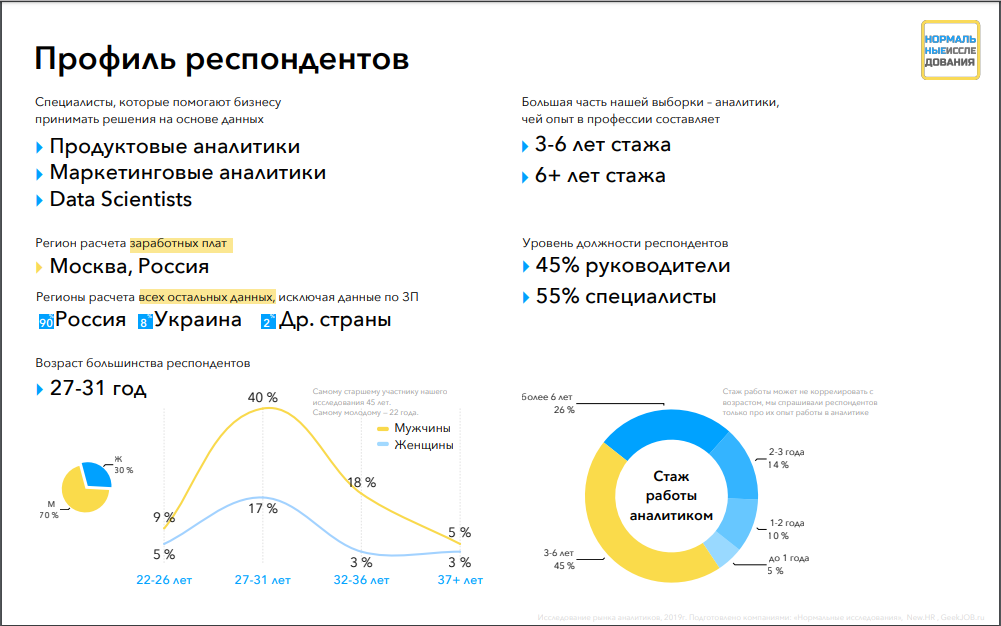
The study involved Data Scientists, product and marketing analysts.
The questionnaire was completed by 150 people (20% of those requested). Most of them are 27-31 years old - both men and women. 30% of analysts are women. The oldest participant in the study is 45 years old, and the youngest is 22 years old.
Most of the respondents have been working in analytics for 3 years (71%) as specialists (55%).
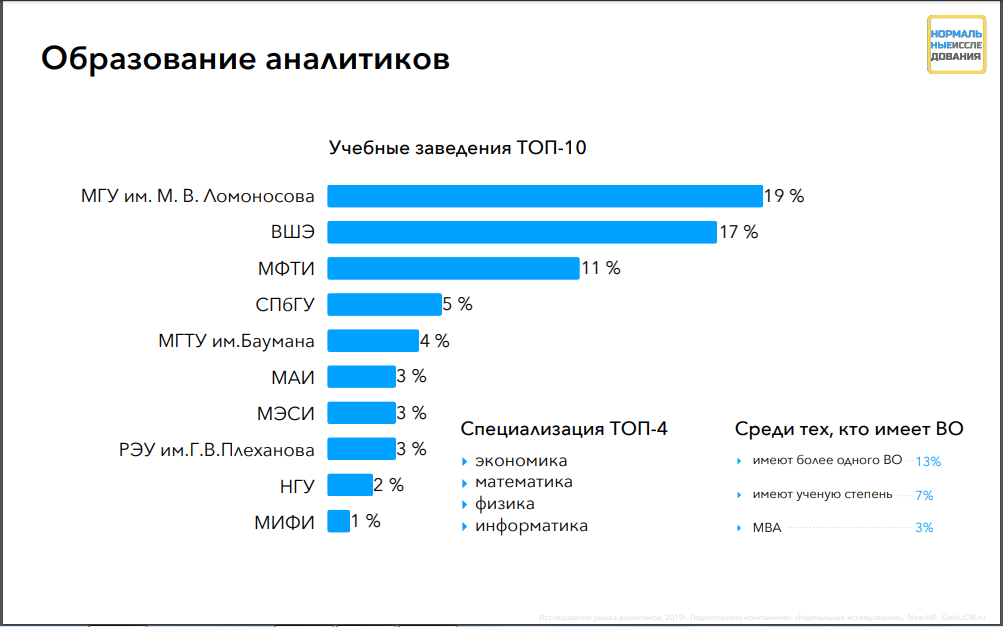
There were no surprises in terms of “crusts”: Moscow State University, Higher School of Economics, Moscow Institute of Physics and Technology, St. Petersburg State University and Baumanka among the top five. Among the specializations, economy is the leader, and only then mathematics, physics and computer science.
Unexpectedly: 6% of respondents do not have higher education , while many of them are managers with an analytical experience of more than 3 years.
23% received non-core specializations. Certified geologists, journalists, linguists, diplomats, psychologists with their own examples prove that specialized education is not a prerequisite for the successful work of an analyst .
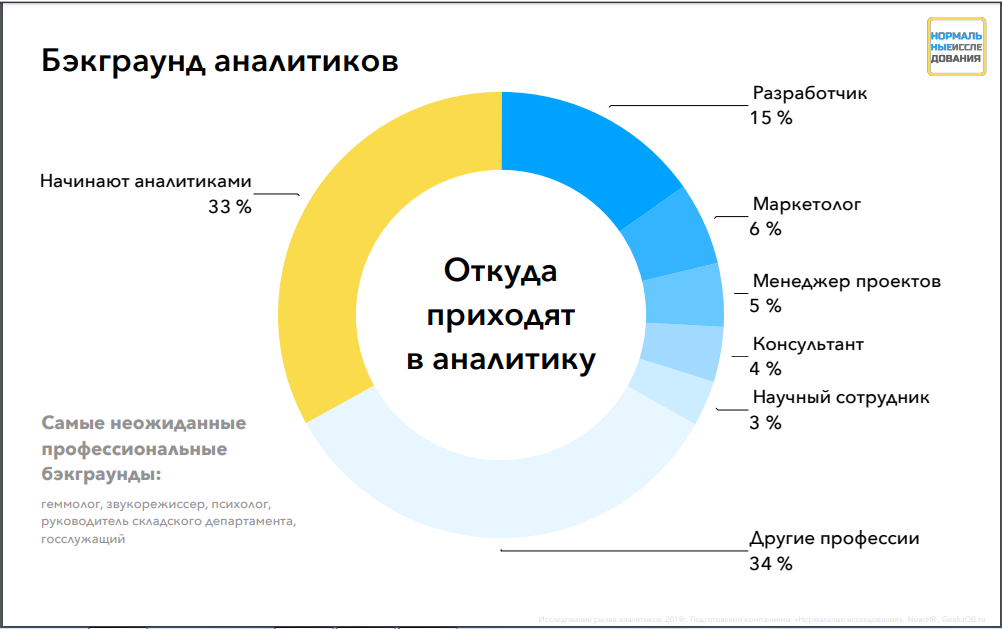
A significant 34% of respondents came to analytics from other professions . For example, there are success stories of a former violinist and pianist. If a specialist worked as an analyst for 3-5 years, then a non-core background ceases to be important.
Interestingly, many employers value analysts who have any business of their own. Such employees understand the principles of doing business, and therefore the practical meaning of the numbers.
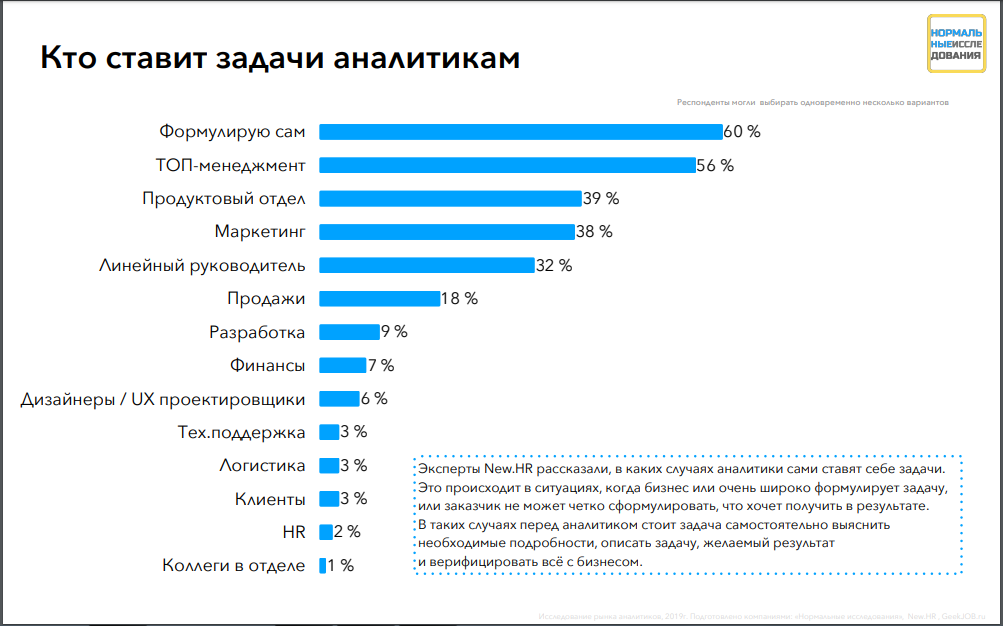
60% of respondents formulate the tasks themselves and work out them in detail. This happens when the customer cannot clearly explain the task or tell what result needs to be achieved.
The study also showed that analysts are often forced to dive into related areas. Especially if the company is small and you have to do a lot yourself.
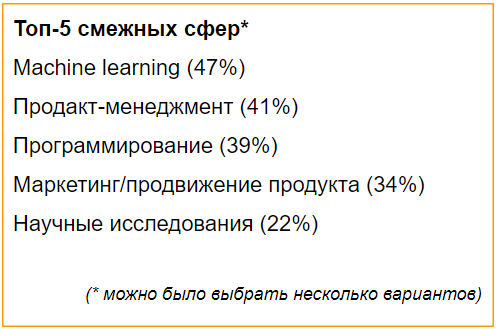
Most work in the office, and only 7% work remotely. At the same time, experts at New.HR note a growing trend for distance work . For example, it is relevant for startups to reduce office maintenance costs and hire people from anywhere in the world.
Combine hiring and self-employment - 8%, and 4% work only “for themselves”. Specialists perform one-time tasks: for example, they build an analytical infrastructure, set up dashboards, and form metric systems. In the future, they can be supported by a less expensive specialist.
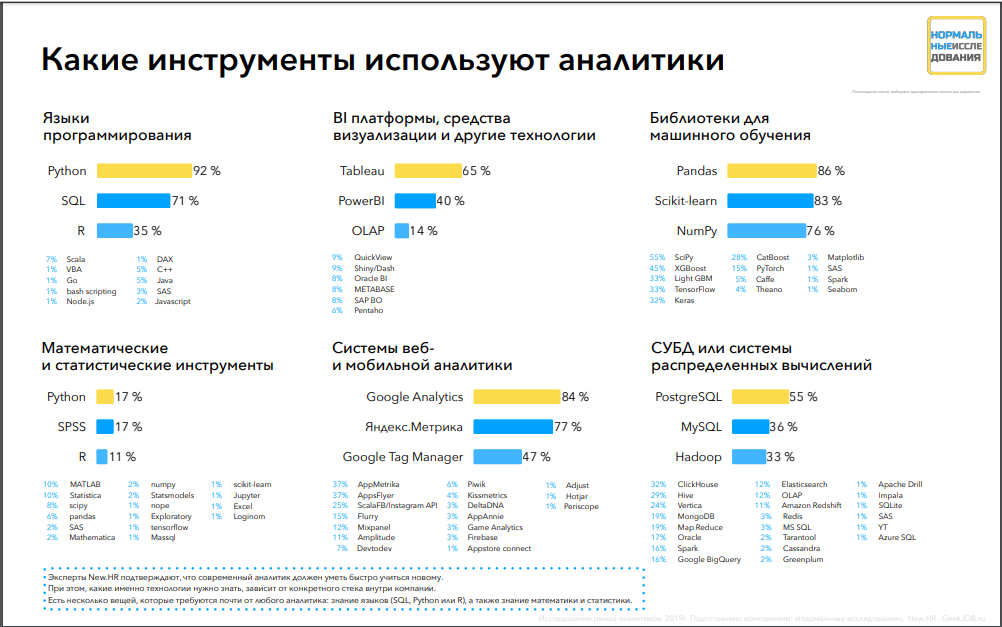
The most popular are Python, Tableau, Pandas, PostgreSQL, Google Analytics. Almost any analyst is required to know languages (SQL, Python or R), mathematics and statistics.
Data Scientists are the most sought after and therefore the most expensive specialists.
Specifically, then Data Scientists with work experience of 3 years or more receive from 310 thousand rubles (the combined data of specialists and managers). This is 70% more than the salary of a marketing analyst (182 thousand rubles) and 13% more than a grocery salary (274 thousand rubles).
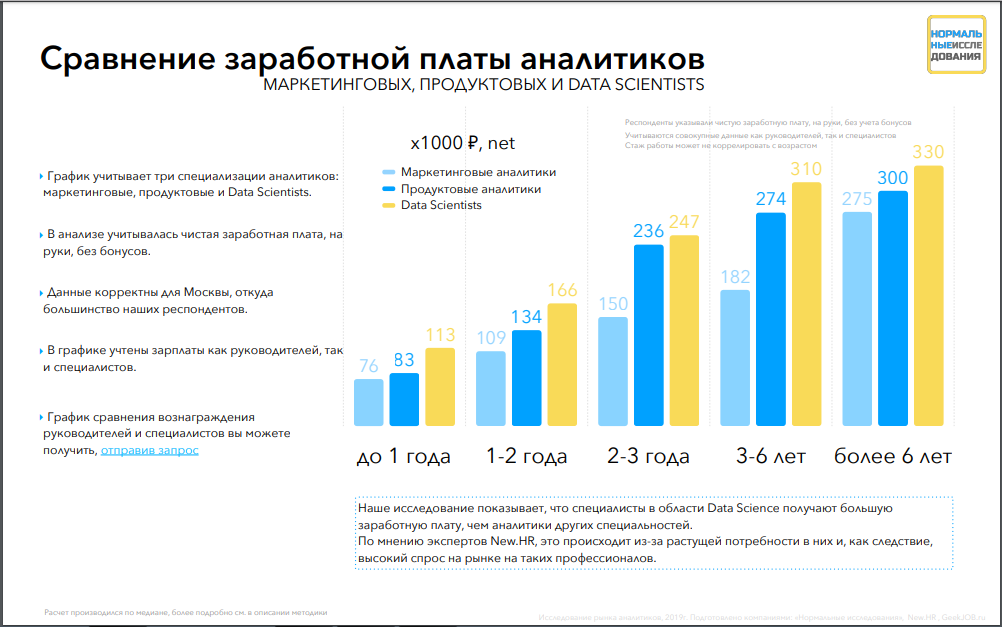
The figures are for Moscow, since more than 80% of respondents are from the capital.
When asked about salary increases over the past year, 74% answered positively. Of these, 33% changed the company, 30% did a good job, 26% received a planned increase and the same amount changed the area of responsibility. Among other reasons - a change of position / project / department, receiving a counter-offer.
58% of analysts receive bonuses: 79% - for KPI, regardless of KPI completed - 8%. But 13% of respondents do not know why they are paid a premium. Bonuses are generally 20% or less of total revenue.
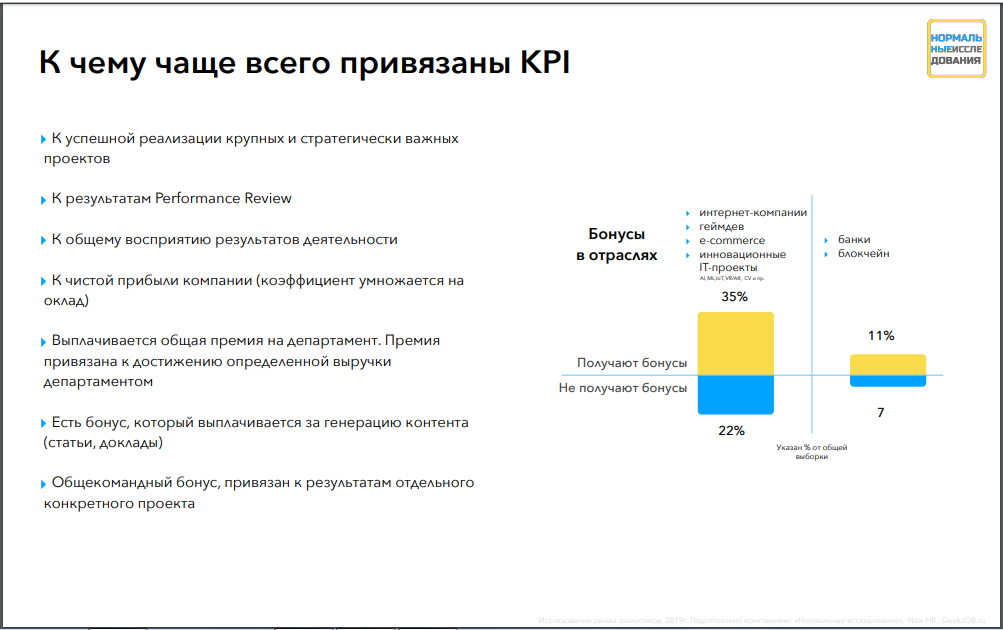
Of the non-standard bonuses, the following can be distinguished:
We believe that one of the key findings of the study, which will not let employers sleep peacefully, is that almost every analyst is ready to change jobs . Only 2% of respondents remained in the camp of loyal employees.
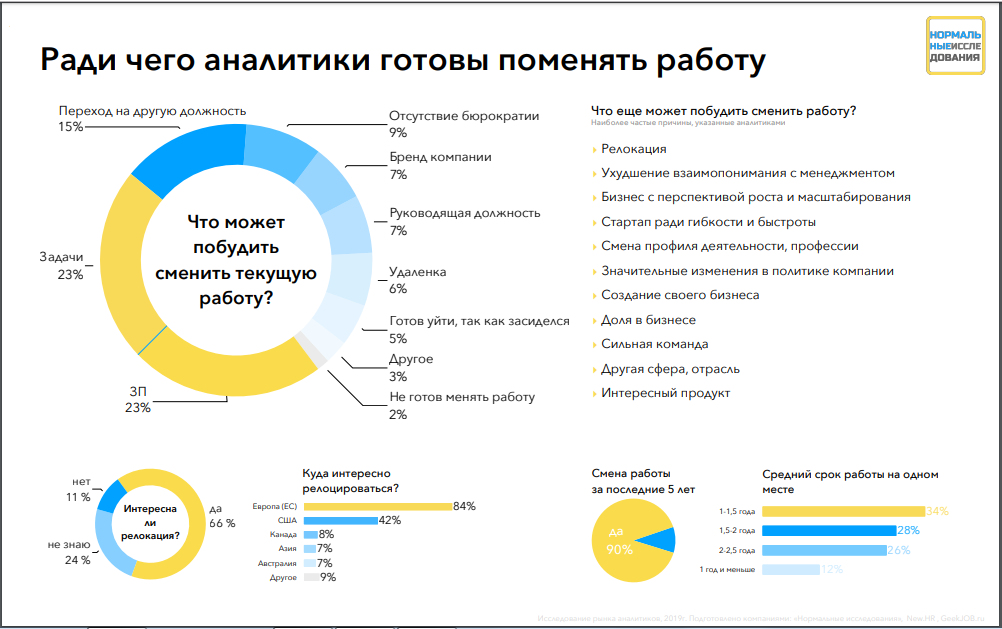
Most analysts change jobs once every 1.5-2 years. Frequent job changes are associated with their high demand in the market.
The main motives for changing jobs :
66% are open to discuss relocation. To reduce the risk of losing key IT professionals, some Russian companies specifically open offices abroad and transport employees there. Others rely on remote work.
It turned out that the less experience a specialist has, the higher salary expectations .
For example, for an analyst with less than a year of experience, the difference between the current and the desired salary is 69%. True, there is a decline further as the specialist gains experience and is already able to adequately assess his value.
On average, active search analysts want to increase their salaries by 10-20% from the current level. But, if a professional is hunted, his expectations may be higher than those of actively seeking.
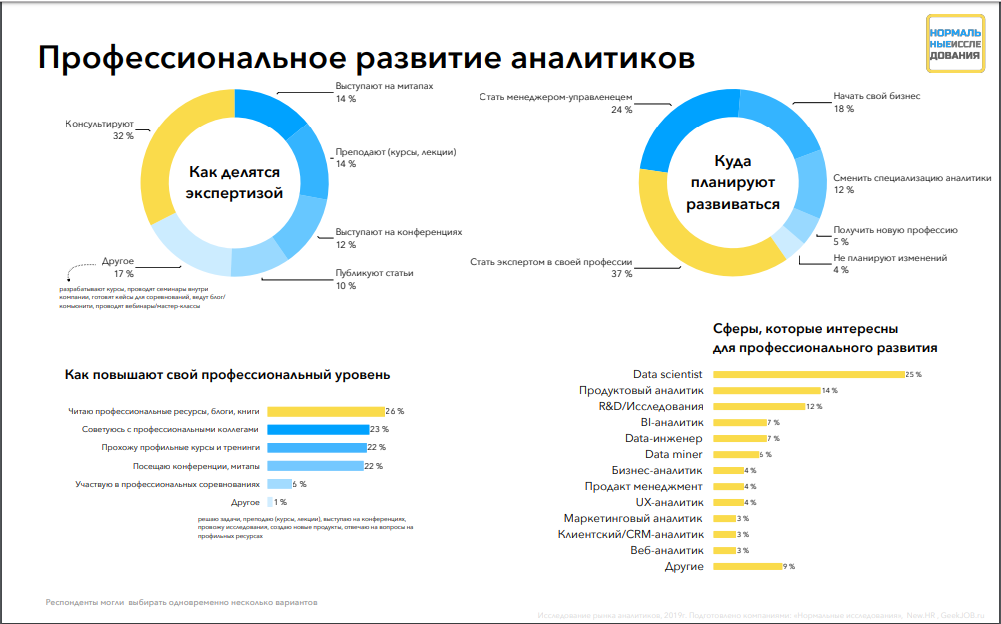
Almost 40% want to become an expert in their field, while 5% want to get a new profession.
More than a quarter of respondents are engaged in self-education. 23% consult with colleagues. Top 3 training programs and industry events close each other (22% each). Also, to improve the professional level, analysts compete, teach and speak at conferences, answer questions on specialized platforms, create new products.
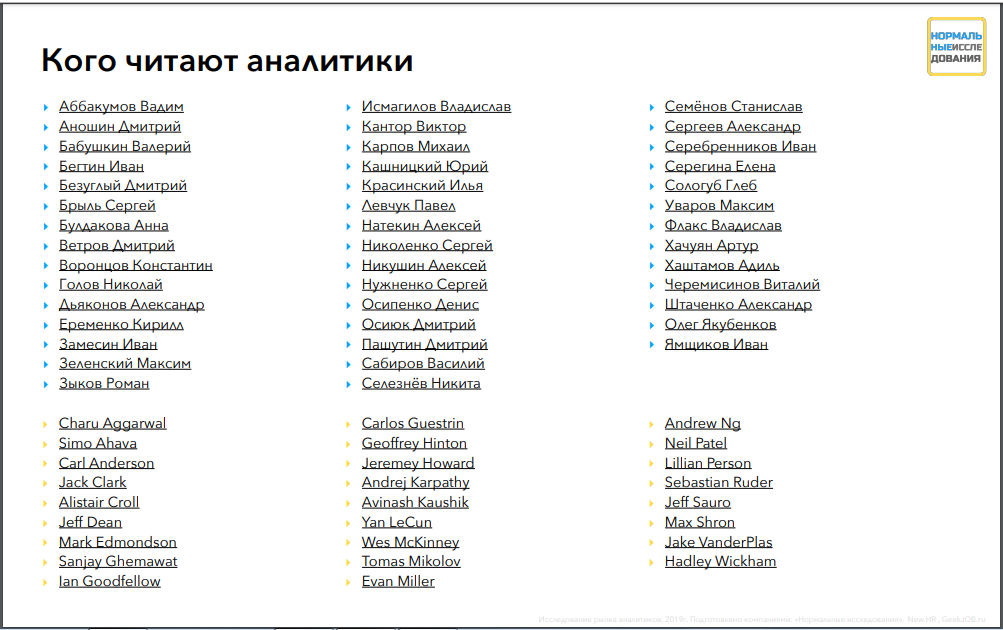
The authors of the study made an extensive selection of Russian and foreign experts, whose opinion is considered authoritative and experience significant.
Respondents

The study involved Data Scientists, product and marketing analysts.
The questionnaire was completed by 150 people (20% of those requested). Most of them are 27-31 years old - both men and women. 30% of analysts are women. The oldest participant in the study is 45 years old, and the youngest is 22 years old.
Most of the respondents have been working in analytics for 3 years (71%) as specialists (55%).
Education and Background

There were no surprises in terms of “crusts”: Moscow State University, Higher School of Economics, Moscow Institute of Physics and Technology, St. Petersburg State University and Baumanka among the top five. Among the specializations, economy is the leader, and only then mathematics, physics and computer science.
Unexpectedly: 6% of respondents do not have higher education , while many of them are managers with an analytical experience of more than 3 years.
23% received non-core specializations. Certified geologists, journalists, linguists, diplomats, psychologists with their own examples prove that specialized education is not a prerequisite for the successful work of an analyst .

A significant 34% of respondents came to analytics from other professions . For example, there are success stories of a former violinist and pianist. If a specialist worked as an analyst for 3-5 years, then a non-core background ceases to be important.
Interestingly, many employers value analysts who have any business of their own. Such employees understand the principles of doing business, and therefore the practical meaning of the numbers.
Tasks

60% of respondents formulate the tasks themselves and work out them in detail. This happens when the customer cannot clearly explain the task or tell what result needs to be achieved.
The study also showed that analysts are often forced to dive into related areas. Especially if the company is small and you have to do a lot yourself.

Work format
Most work in the office, and only 7% work remotely. At the same time, experts at New.HR note a growing trend for distance work . For example, it is relevant for startups to reduce office maintenance costs and hire people from anywhere in the world.
Combine hiring and self-employment - 8%, and 4% work only “for themselves”. Specialists perform one-time tasks: for example, they build an analytical infrastructure, set up dashboards, and form metric systems. In the future, they can be supported by a less expensive specialist.
Instruments

The most popular are Python, Tableau, Pandas, PostgreSQL, Google Analytics. Almost any analyst is required to know languages (SQL, Python or R), mathematics and statistics.
Wage
Data Scientists are the most sought after and therefore the most expensive specialists.
Specifically, then Data Scientists with work experience of 3 years or more receive from 310 thousand rubles (the combined data of specialists and managers). This is 70% more than the salary of a marketing analyst (182 thousand rubles) and 13% more than a grocery salary (274 thousand rubles).

The figures are for Moscow, since more than 80% of respondents are from the capital.
When asked about salary increases over the past year, 74% answered positively. Of these, 33% changed the company, 30% did a good job, 26% received a planned increase and the same amount changed the area of responsibility. Among other reasons - a change of position / project / department, receiving a counter-offer.
Bonuses and KPI
58% of analysts receive bonuses: 79% - for KPI, regardless of KPI completed - 8%. But 13% of respondents do not know why they are paid a premium. Bonuses are generally 20% or less of total revenue.

Of the non-standard bonuses, the following can be distinguished:
- for representing the company at events, conferences, in publications;
- for training internal customers to use analytics for their needs.
Job change
We believe that one of the key findings of the study, which will not let employers sleep peacefully, is that almost every analyst is ready to change jobs . Only 2% of respondents remained in the camp of loyal employees.

Most analysts change jobs once every 1.5-2 years. Frequent job changes are associated with their high demand in the market.
The main motives for changing jobs :
- salary increase (23%);
- functionality (23%);
- transfer to another position (15%).
66% are open to discuss relocation. To reduce the risk of losing key IT professionals, some Russian companies specifically open offices abroad and transport employees there. Others rely on remote work.
It turned out that the less experience a specialist has, the higher salary expectations .
For example, for an analyst with less than a year of experience, the difference between the current and the desired salary is 69%. True, there is a decline further as the specialist gains experience and is already able to adequately assess his value.
On average, active search analysts want to increase their salaries by 10-20% from the current level. But, if a professional is hunted, his expectations may be higher than those of actively seeking.
Professional Development

Almost 40% want to become an expert in their field, while 5% want to get a new profession.
More than a quarter of respondents are engaged in self-education. 23% consult with colleagues. Top 3 training programs and industry events close each other (22% each). Also, to improve the professional level, analysts compete, teach and speak at conferences, answer questions on specialized platforms, create new products.
Who do analysts read?

The authors of the study made an extensive selection of Russian and foreign experts, whose opinion is considered authoritative and experience significant.
Summary: key findings
- Many experts came to analytics from other areas, and profile education is not the main condition for successful work.
- Most analysts work in the office, but the number of remote workers is growing.
- Analysts are in demand in the market, so they often change jobs, not staying in one place for more than two years.
- Specialists often independently formulate and work out tasks.
From the editors
- Beginner Course " Start in Analytics ".
- Profession Data Scientist .
- Course " Big Data from scratch ."
- Course " Market Analyst ".
All Articles